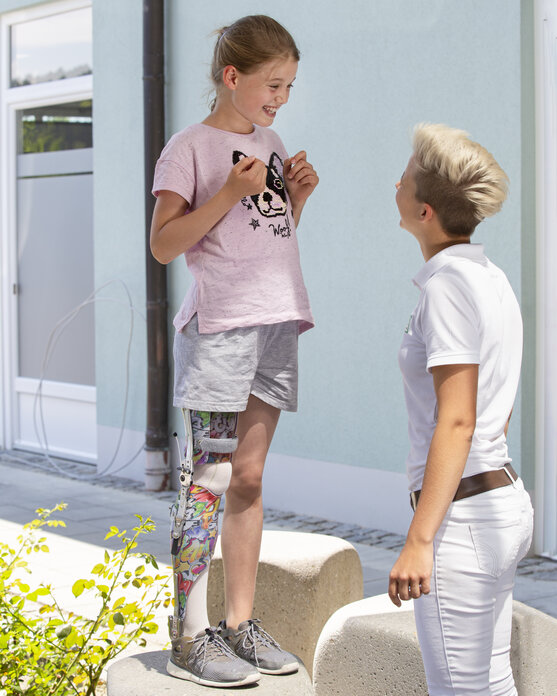An orthosis compensates for physical deficits, supports joints and protects them from relapses and malpositions.
We train you in the daily use of your orthosis.
Make an appointment over the phone or send us a message!

Aid for protecting and supporting
The Knee ankle foot orthosis
The overall aim of an orthosis is providing the patient with the greatest possible safety and mobility in everyday life. A knee ankle foot orthosis (KAFO) is used to supplement and support lost or weakened leg functions. It provides correction, stabilization, guidance or off-loading of the entire leg (including the ankle and knee joint).
The difference between a KAFO and a lower leg orthosis is the possibility of integrating a movable knee joint.

Tailored support
Full leg stability
The knee ankle foot orthosis is tailor-made and individually adapted to your needs. Whether it’s a static positional orthosis or a flexible orthosis with adjustable joints, we personally address each of our patients and work together to find the best possible treatment solution.
The individual components of a KAFO (thigh, lower leg and foot part) are either permanently connected to one another or can be removed individually. If both legs are affected, we manufacture bilateral KAFO's for you and, if necessary, couple them with a pelvic section.
In order to offer you a visually appealing knee ankle foot orthosis that is stable and light at the same time, we only use state-of-the-art materials such as carbon in prepreg technology and plastics. Because the orthosis fits snugly around the leg, it can be easily worn under clothing.
What does your leg need?
Static or dynamic
Static orthoses are intended to fix affected joints in their correction position. Dynamically acting orthosis, on the other hand, corrects malpositions (e.g. with tendon shortening) under the influence of force, e.g. through the use of spring hinges or gas springs.
Depending on the clinical picture and characteristics (e.g. ICP, AMC, plexus paralysis, radial aplasia, etc.), different designs can be selected:
- dynamic joints for flexion, extension, pronation or supination
- different closure systems
- adapters for putting on individual components of the orthosis
Static as well as dynamic orthoses are often worn at night. At night, the affected limb can be fixed or corrected over a long period of time. More functional orthoses are usually made for daytime use.


Walking school
At our gait school, specially trained physiotherapists will help you practice the gait and walking technique with your KAFO. The aim of this training is to achieve a physiologically correct gait pattern.
For this, we first carry out a gait analysis. Based on the results, our physiotherapists will determine individual exercises and therapy priorities for you. This will ensure that your training is optimally suited to your physical requirements and training goals.
We will also show you how to use your knee ankle foot orthosis correctly in everyday life. Specifically, we practice walking safely on uneven ground, climbing stairs and overcoming obstacles.
Of course, we also regularly check your KAFO for correct seating, pressure marks and possible signs of wear.

Let yourself be inspired! We accompany many interesting patients during their Pohlig appointment and give you personal insights.

For those who want to delve even deeper into the matter, we have a suitable video for almost every supply area.

Take a look behind the scenes at Pohlig and find out about diagnoses and our innovative aid solutions!

